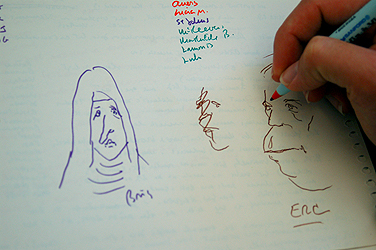 Buechner, an inveterate doodler, writes nearly all of his works initially in long-hand. His papers contain book manuscripts, correspondence, articles, photographs, and published items. Recognized by Pulitzer Prize winner Annie Dillard as “one of our finest writers.” Buechner received an O. Henry Award – Third Prize (1955) and the Critic’s Choice Books Award (1990). Additionally, he has received honorary doctorates from Virginia Theological Seminary (1982); Lehigh University (1987); Cornell College (1989); Yale University (1990); and Wake Forest University (2000). Godric, dedicated to his father, was runner-up for the Pulitzer Prize in 1981. Brendan (1987) was nominated for the National Book Award. He has authored over thirty works of fiction and non-fiction. The papers of Frederick Buechner, author, lecturer and ordained Presbyterian minister, occupies approximately 55 linear feet.
Buechner, an inveterate doodler, writes nearly all of his works initially in long-hand. His papers contain book manuscripts, correspondence, articles, photographs, and published items. Recognized by Pulitzer Prize winner Annie Dillard as “one of our finest writers.” Buechner received an O. Henry Award – Third Prize (1955) and the Critic’s Choice Books Award (1990). Additionally, he has received honorary doctorates from Virginia Theological Seminary (1982); Lehigh University (1987); Cornell College (1989); Yale University (1990); and Wake Forest University (2000). Godric, dedicated to his father, was runner-up for the Pulitzer Prize in 1981. Brendan (1987) was nominated for the National Book Award. He has authored over thirty works of fiction and non-fiction. The papers of Frederick Buechner, author, lecturer and ordained Presbyterian minister, occupies approximately 55 linear feet.
Monthly Archives: September 2008
Leanne Payne autobiography published
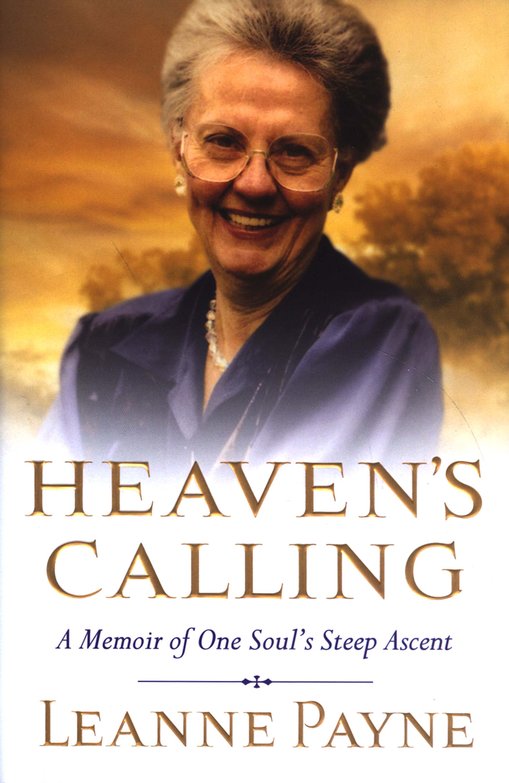 Leanne Payne’s autobiography, Heaven’s Calling: A Memoir of One Soul’s Steep Ascent (2008), unfolds the ever-rolling road of an extraordinarily rich and adventurous faith-life, moving gracefully from her childhood to her years as a student at Wheaton College, and finally to her role as author and founder of Pastoral Care Ministries. She describes her passion for healing prayer and sacramental worship, emphasizing the necessity of Christian emblems when re-educating the paganized, or “bent,” mind toward contemplating the holy things of Christ. Along the way she recognizes mentors such as her mother, Charismatic pioneer Richard Winkler and author/teacher Agnes Sanford, Payne devotes an entire chapter to the late Dr. Clyde Kilby. “To say that my debt to Dr. Kilby is very great indeed is to understate the case,” she writes. Payne highlights his efforts in publicizing the works of C.S. Lewis, in addition to describing the unhurried simplicity of Kilby’s classroom teaching and devotional life, both a continuing inspiration to students and notable graduates, including pastor John Piper, author Thomas Howard and poet Luci Shaw. Payne’s prose is musical and distinctly feminine. Her walk of faith is an upward path, and she inspires her readers to a celebration of life in Christ. Leanne Payne’s papers are classified as SC-125 in Wheaton’s Special Collections.
Leanne Payne’s autobiography, Heaven’s Calling: A Memoir of One Soul’s Steep Ascent (2008), unfolds the ever-rolling road of an extraordinarily rich and adventurous faith-life, moving gracefully from her childhood to her years as a student at Wheaton College, and finally to her role as author and founder of Pastoral Care Ministries. She describes her passion for healing prayer and sacramental worship, emphasizing the necessity of Christian emblems when re-educating the paganized, or “bent,” mind toward contemplating the holy things of Christ. Along the way she recognizes mentors such as her mother, Charismatic pioneer Richard Winkler and author/teacher Agnes Sanford, Payne devotes an entire chapter to the late Dr. Clyde Kilby. “To say that my debt to Dr. Kilby is very great indeed is to understate the case,” she writes. Payne highlights his efforts in publicizing the works of C.S. Lewis, in addition to describing the unhurried simplicity of Kilby’s classroom teaching and devotional life, both a continuing inspiration to students and notable graduates, including pastor John Piper, author Thomas Howard and poet Luci Shaw. Payne’s prose is musical and distinctly feminine. Her walk of faith is an upward path, and she inspires her readers to a celebration of life in Christ. Leanne Payne’s papers are classified as SC-125 in Wheaton’s Special Collections.
The Galloping Ghost, by Gary Andrew Poole, recently published
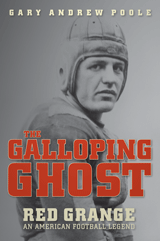 Harold E. “Red” Grange is the most important figure in American football history. In 1924, playing for the University of Illinois, he scored four touchdowns in 12 minutes against Michigan. And so Grange, nicknamed “the Galloping Ghost” by Chicago sports writer Warren Brown, forever secured his reputation as a gridiron legend. Grange dazzled fans, inspired poetry, starred in films, and was the first celebrity product endorser. In 2008 he was ranked #1 on ESPN’s Top 25 Players in College Football History list. But who was the nation’s first football hero? From barnstorming tours to stadium rallies, from the White House to Hollywood, Gary Andrew Poole’s The Galloping Ghost, the first critical biography of “Red” Grange, chronicles the meteoric rise of this extraordinary athlete. Drawing on extensive research and interviews, Poole details not only Grange’s relationship with Bears manager George Halas and his later life as motivational speaker and tv sports commentator, but he also touches on the shadowy aspects of 1920s sports management, exploring the influence of Grange’s agent, the visionary but unscrupulous C.C. Pyle, known then as “Cash-and-Carry Pyle” and now as “the first Jerry Maguire.” The Galloping Ghost is an energetic, perceptive account of a star athlete who defined the finest qualities of American sportsmanship.
Harold E. “Red” Grange is the most important figure in American football history. In 1924, playing for the University of Illinois, he scored four touchdowns in 12 minutes against Michigan. And so Grange, nicknamed “the Galloping Ghost” by Chicago sports writer Warren Brown, forever secured his reputation as a gridiron legend. Grange dazzled fans, inspired poetry, starred in films, and was the first celebrity product endorser. In 2008 he was ranked #1 on ESPN’s Top 25 Players in College Football History list. But who was the nation’s first football hero? From barnstorming tours to stadium rallies, from the White House to Hollywood, Gary Andrew Poole’s The Galloping Ghost, the first critical biography of “Red” Grange, chronicles the meteoric rise of this extraordinary athlete. Drawing on extensive research and interviews, Poole details not only Grange’s relationship with Bears manager George Halas and his later life as motivational speaker and tv sports commentator, but he also touches on the shadowy aspects of 1920s sports management, exploring the influence of Grange’s agent, the visionary but unscrupulous C.C. Pyle, known then as “Cash-and-Carry Pyle” and now as “the first Jerry Maguire.” The Galloping Ghost is an energetic, perceptive account of a star athlete who defined the finest qualities of American sportsmanship.
Pulped Old Rags: some fine rare books in Special Collections
I love the press of letters in thick paper,
the roughness sizzles my fingers
with centuries of craft embedded in pulp old rags,
my hands caress the leather of old bindings
crumbling like ancient gentlemen.
Jerry Stern
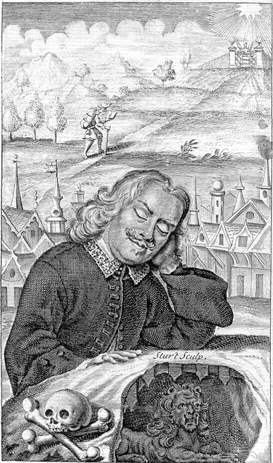 In this day of technology and rapid information service and growth many decry the soon extinction of the book. Ah, but when someone handles and, as the author of the above work states, caresses a fine rare book, one does not easily look to its demise. Books are wonders. They are thoughts distributed to the world. They are invitations to new possibilities and new horizons. Technology does not take this away, it merely supplements it.
In this day of technology and rapid information service and growth many decry the soon extinction of the book. Ah, but when someone handles and, as the author of the above work states, caresses a fine rare book, one does not easily look to its demise. Books are wonders. They are thoughts distributed to the world. They are invitations to new possibilities and new horizons. Technology does not take this away, it merely supplements it.
Special Collections has wondrous examples of the power of the book, as presenter of ideas and as art. Special Collections’ foundational collection, SC-01, was a gift from rare-book collector William Sanford Akin. His immense gift of thousands of books that are worth hundreds of thousands of dollars was given in the memory of his dear friend, V. Raymond Edman. This collection contains one of the most extensive collections of English dictionaries by Samuel Johnson in the country along with hundreds of editions of Bunyan’s Pilgrim’s Progress. This collection is a rich resource for the college.
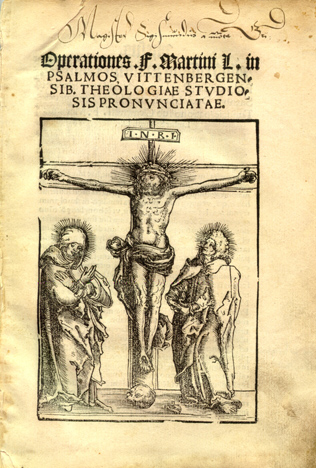 Another collection worthy of attention is the general Rare Book collection, SC-10. In this collection we have a treasure trove of unique items. The earliest item in our holdings is Operationes in psalmos by Martin Luther and published in 1519. This work was written while Luther was still within the Roman church struggling for reform and before he made his historic statement at the Diet of Worm in 1521, “Here I stand, I can do no other.” Another Luther item is Philipp Melancthon’s oration at Luther’s funeral. This is bound together with four sermons that Luther gave just prior to his death. Both were printed in Wittenberg in 1546, the year Luther died.
Another collection worthy of attention is the general Rare Book collection, SC-10. In this collection we have a treasure trove of unique items. The earliest item in our holdings is Operationes in psalmos by Martin Luther and published in 1519. This work was written while Luther was still within the Roman church struggling for reform and before he made his historic statement at the Diet of Worm in 1521, “Here I stand, I can do no other.” Another Luther item is Philipp Melancthon’s oration at Luther’s funeral. This is bound together with four sermons that Luther gave just prior to his death. Both were printed in Wittenberg in 1546, the year Luther died.
Is the book dead? By no means! Despite statements that books are soon to be ephemeral, the book is a symbol of longevity. Western culture is intrinsically tied to the written work, especially as exemplified in the book and its legacy of constancy is welcome in today’s world. Will communication methods change, certainly, as they have for centuries. However, there is nothing like caressing the “leather of old.” I’d urge you to visit the Special Collections and see the abundant storehouse of rare books awaiting you.